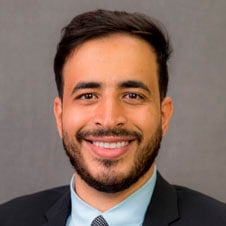Whether you are coming from the workforce or straight from college, the transition to medical school can be daunting.
“Starting medical school was interesting because there seemed to be a lot more responsibility and time that you had to dedicate towards the craft,” said Mohammad Ibrahim, DO, a sports medicine fellow at University of Michigan Health-West. “A lot more studying went into it than my undergraduate studies, so that presented its own challenges. I was expecting it to be more time-consuming, but I didn't expect it to be at the level it was.”
M1s often speak of the body of knowledge they are asked to digest in their first year of medical school as being akin to drinking from a firehose. That is often paired with navigating new social dynamics and adjusting to life in a new setting.
Looking back on his first months as a student at Michigan State University College of Osteopathic Medicine in 2014, Dr. Ibrahim reflected on the unique challenges of the transition to medical school for the AMA’s “What I Wish I Knew in Medical School” series.
As a new batch of medical students prepares to arrive on campus, Dr. Ibrahim offered some direction about how to survive those opening months.
Whether success means strengthening your leadership skills, honing your voice as an advocate or finding the right research opportunity, the AMA has the resources you need, from your white-coat ceremony through medical school graduation.
Effective study requires time, efficiency
“The ideal medical student would have been studying approximately two to four hours per day after classes,” said Dr. Ibrahim, an AMA member. “The start of medical school was a bit rough because I was trying to find my own study strategy at the beginning of medical school. Because I had to study so much more, I was trying to see what other people were doing and trying to implement their study strategies for my own. So I was trying many different study strategies. At the end of the day, it was overwhelming, which didn't help the process.
The best method for studying is “about using the resources that you know are going to help you, which might take some time to figure out,” Dr. Ibrahim said. “For example, some people studied through different question banks, different textbooks, different resource materials. It’s best to try and find what helps you and that’s sort of individualized. What I ended up using the most was sticking to our course materials as well as questions related to the course materials.”
Dive deeper:
- Hone these good habits as an M1—it will pay off
- Know the pros and cons of third-party medical school study resources
- Mastering M1: Top questions for your first year of medical school
Seek guidance from students, faculty
“When you’re trying to pare down how to study, see what resources the syllabus has and talk to the people in your medical school,” said Dr. Ibrahim. “That’s actually probably the most important thing to do. Talk to the people in your medical school who have already gone through their M1 year and see what they did to study and what they said most people in their classes did.”
“Get to know the faculty, get to know administration, be friends with them. Talk about the issues you're having. They can point you in the right direction, and there is a whole support system out there for you, even within your own institution and just getting to know the faculty and administration can take you far away.”
Disappointment is inevitable
“The first exam is usually the train that hits you hardest,” Dr. Ibrahim said. “A lot of people fail. After that, you understand what the expectation is and find your way to succeed from there. Once you understand how they really want you to think, exams become easier.
The disappointment “is all part of a resiliency journey,” he added. “In life, you're going to fail, or you're going to be disappointed no matter what. It's going to eventually happen, so it's about understanding that this is an inevitable thing. You'll work harder next time to make sure you try your best for it not to happen.
“At the end of the day, it's all about perspective, right? This is just an exam. You're not currently treating patients, and you’ll improve your performance in the future to get the knowledge to help you treat patients in the future. Use the exams as a tool in this regard.”
Dive deeper:
- Adrift as an M1? Essential advice to help you right the ship
- Succeeding in medical school: The ultimate guide
Be present
“Some people always went to class and that's how they learn and that's great,” Dr. Ibrahim said. “Some people never went to class but learned through the virtual classes and recorded lectures. That being said, in medical school there is no such thing as being 100% online. You might have virtual classes which are didactic sessions, but at the end of the day you're going to be taught in-person in various modalities to become a physician.
“There's anatomy lab and clinical skills suite and for osteopathic medical students there is going to be your own OMM or osteopathic manipulative medicine lab, so there are lots of varying in-person teachings and in-person lessons to be learned and even group sessions on top of that. There are also specialist lectures where you're going to want to be there to be part of the discussion.”
It is “worth making an effort to attend lectures at the start of school,” Dr. Ibrahim said.
“It's a good opportunity to know your classmates, to ... be able to have a nice support system. Over time, as you define your own studying and your own strategies, you can make decisions on what needs to be in-person for you.”
Dive deeper:
- Why some medical students prefer video lectures
- 5 tips to survive first-year anatomy lessons in medical school
Take time away from school
“How you recharge is going to be different for everyone,” Dr. Ibrahim said. “In the beginning of my medical school career, it was finding time to be able to go out for food with family or friends. Finding enough time to get good sleep is important, and so is exercise.
“Looking back, I wish I would have been more involved with professional organizations, like the AMA, because that's also a form of recharging, which I would have found very helpful. It would have given me yet another pool of people who also went through the same process.
“Although we all had our friends from undergrad, once you get to medical school, you kind of see your fellow medical school students so often that the other students become your core group of friends. Those are almost the only people you see for a while until you start incorporating your old friends again.
When you socialize with other students, “make sure you are experiencing life and not just studying. When you're always studying, you don't really get to know [people] outside of the walls of the library. There's a whole different life that's living outside of our health care institution. It's about seeing other people inside the community, interacting with them, and breaking bread. These are new friends and future colleagues. It's also exciting to get to know other people while you are on your medical journey.”
Dive deeper:
- What medical students need to know about self-care
- Take a mindful approach to manage med school stress
- How to spend your final free summer as a med student
More on the transition to med school
The AMA’s Facilitating Effective Transitions Along the Medical Education Continuum handbook looks at the needs of learners across the continuum of medical education—from the beginning of medical school through the final stage of residency.
The learner sections in this book, which was created by the AMA Accelerating Change in Medical Education Consortium, help medical students and resident physicians acclimate to the various settings and expectations in the medical training environment. The faculty sections then provide blueprints for transition programming, as well as resources to help students and residents navigate challenges in transitions. Download the handbook now.





